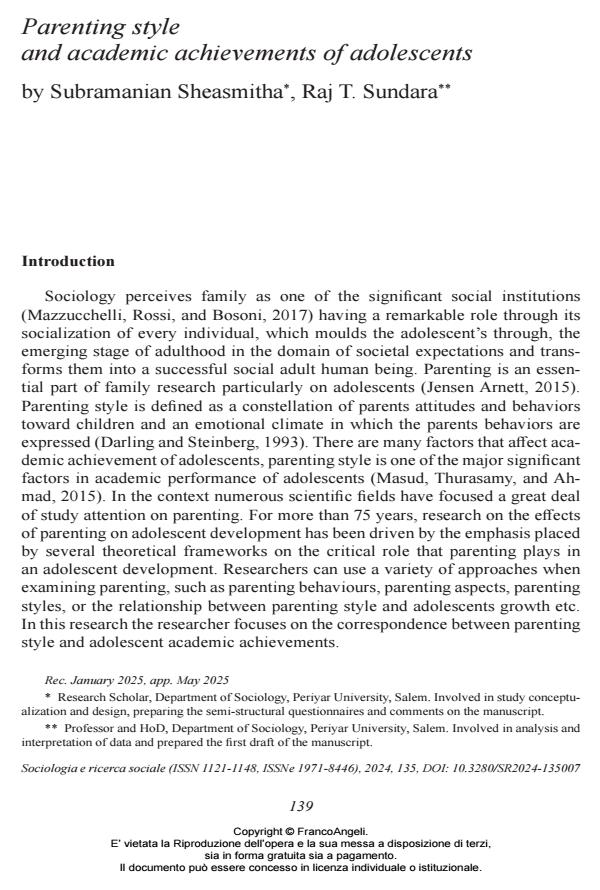Parenting style and academic achievements of adolescents
Titolo Rivista SOCIOLOGIA E RICERCA SOCIALE
Autori/Curatori Subramanian Sheasmitha, Raj T. Sundara
Anno di pubblicazione 2025 Fascicolo 2024/135
Lingua Italiano Numero pagine 19 P. 139-157 Dimensione file 259 KB
DOI 10.3280/SR2024-135007
Il DOI è il codice a barre della proprietà intellettuale: per saperne di più
clicca qui
Qui sotto puoi vedere in anteprima la prima pagina di questo articolo.
Se questo articolo ti interessa, lo puoi acquistare (e scaricare in formato pdf) seguendo le facili indicazioni per acquistare il download credit. Acquista Download Credits per scaricare questo Articolo in formato PDF

FrancoAngeli è membro della Publishers International Linking Association, Inc (PILA), associazione indipendente e non profit per facilitare (attraverso i servizi tecnologici implementati da CrossRef.org) l’accesso degli studiosi ai contenuti digitali nelle pubblicazioni professionali e scientifiche.
In the modern world, adolescence is a central part of the development of the self, which undergoes significant social, emotional, and intellectual changes. The social environment, including familial structures and interactions, strongly influences these changes. In this view, the research exposes the sociological discourse on how parenting style influences the academic achievement of adolescents. This study exposes the different types of parenting styles adopted by their parents and exposes the influence of socio-economic cultural background on parenting. The study gave an attention to the academic achievement of the adolescents. It also gave an attention to providing insight into how socio-economic factors, like family structures, cultural norms and parenting style made their influence on their academic achievement. The study employs descriptive research design and a cross-sectional study. It is predominantly quantitative in nature. The study was exclusively executed among schoolgoing adolescent’s (16-18). To choose the respondents, the study fixed a certain criterion. The study was executed among 310 school going students through the simple random sampling method to select the respondents. The researcher used the Scale of Parental Authority Questionnaire for measuring parenting style and the Academic Performance Scale to measure the academic performance among adolescents. In order to collect the required data, a semistructured interview schedule was adopted and a systematic observation technique was also used to understand the socio-economic and cultural dynamics of the respondents. This study aims to highlight the significant role of parenting styles in shaping the academic achievement of school going adolescents in Salem district. By examining the influence of socio-economic and cultural factors, it provides valuable insights into how the family structures and cultural norms impact academic achievements. The findings will help educational policies and parenting interventions aimed at fostering better academic achievements.
Subramanian Sheasmitha, Raj T. Sundara, Parenting style and academic achievements of adolescents in "SOCIOLOGIA E RICERCA SOCIALE " 135/2024, pp 139-157, DOI: 10.3280/SR2024-135007